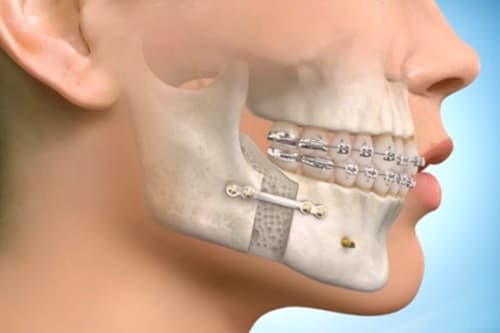When a lower, upper, or both jaws are misaligned in regard to the skull base, or when there is a significant difference between the size of jaws in respect to each other, orthognathic surgery can be performed to correct the situation. Orthognathic surgery is a procedure that can radically alter the contour of your face.
The jaw surgery is only conducted after a thorough initial consultation has taken place. Initial therapy involves realigning the teeth while also removing any unnecessary teeth such as wisdom teeth. This procedure is known as a palatal realignment procedure. When orthodontic treatment is initiated, it is typical for teeth to also be straightened with braces within 18 - 24 months of the treatment's inception.

When the teeth are properly aligned, it is now the appropriate time to undergo orthognathic surgery, which will be performed on either one of the jaws or both jaws. The final orthodontic treatment, which will last around 6 months, will be performed following that procedure.
There are specific conditions that necessitate the necessity for orthognathic surgery, including the following:
Any cosmetic operation entails a substantial financial outlay. Having made the decision to have orthognathic surgery, it is reasonable to wonder, 'How much will the orthognathic surgery cost?' According to the level of reconstruction required, the prices associated with surgery vary from patient to patient. Cosmetic surgery in India is available at a fraction of the cost of cosmetic surgery in the United Kingdom, the United States, and Singapore, and the quality of care is not compromised.
The prices and expenses associated with the surgery vary among individuals & thus are determined by the extent of reconstruction required. The cost of jaw surgery is around Rs. 70,000 to Rs. 3,00,000.
Perfection in anything demands a significant investment of time, effort, and money. However, when it comes to our faces and bodies, our efforts are not always adequate to obtain the results we desire. For people in these situations, cosmetic procedures can be a beneficial investment that allows them to achieve the appearance they have always desired. Among the many different types of corrective procedures available, orthognathic surgery can mold your jaw & give the cheekbones of the dreams.
If you have made the decision to have the finest jaw correction surgery performed, it is critical that you select the greatest orthognathic surgeon for the job. This is due to the fact that jaw correction treatment is a big operation, and only the top orthognathic surgeons would be able to do it successfully and safely.
You may have made the decision to have the top jaw correction surgery because you have some anomalies in your jaw that are interfering with your ability to enjoy your life. Jaw correction treatment will improve your ability to speak and eat, and the greatest orthognathic surgeon may even be able to improve your attractiveness, which is an important factor to consider when deciding whether or not to undergo jaw correction surgery.
Q1. Can all dental misalignments be corrected through orthognathic surgery?
Orthognathic surgery helps correct most of the minor dental misalignments and issues. However if some cases additional surgery may be required.
Q2. How do I eat if my jaws get wired together after the orthognathic surgery?
Once the orthognathic surgery is done, the wires or rubber bands may not be required for more than 2-3 weeks. During this period though you may have difficulty in tasks like eating, brushing, or speaking. It is advised that you follow a liquid diet for that period.
Q3. What is the age criterion for having orthognathic surgery?
Before proceeding with the orthognathic surgery you need to be of the age where the jaws have stopped growing. It is done so that the continued bone growth does not alter the results of the surgery. The ideal age for the same is around 18 for boys and 16 for girls.
Q4. How long will I have to stay in the hospital for the orthognathic surgery?
Normally during this procedure, it is advised that the patient should stay for 2-3 days for conditioning and post-procedure recovery. Your doctor will assess your situation and further advise the time frame.
Q5. Does orthognathic surgery cause a lot of pain?
It may be expected that the post-surgical discomfort may be felt. To counter this, your doctor will prescribe you pain medications to help in the recovery and transition phase.
Q6. Do orthognathic surgery cause swelling and bruising?
The extent of the swelling and bruising may depend on the extent of the condition or the relative complexity of the surgery. The swelling and bruising will subdue with time before going away.